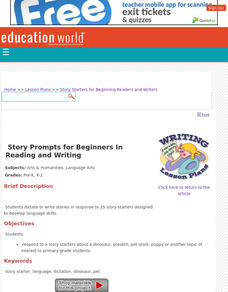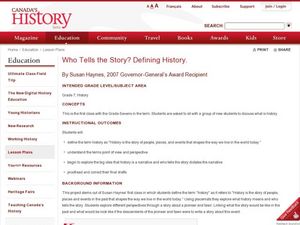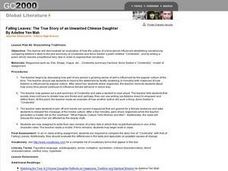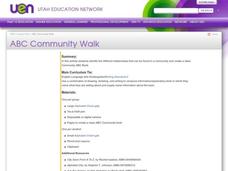Curated OER
Story Starters for Beginning Readers and Writers
Students respond to a story starters about a dinosaur, present, pet store, puppy or another topic of interest to primary-grade students. They dictate or write stories in response to 15 story starters designed to develop language skills.
Curated OER
Experiencing "Romeo and Juliet"
Ninth graders read and analyze the William Shakespeare play "Romeo and Juliet" and compare it to the 1996 modern version of the play and the movie "West Side Story." They write an essay comparing and contrasting the three versions.
Curated OER
Activity Plan 5-6: Let's Create Stories!
Students examine wordless books and other pictures in order to learn how the teacher "reads a picture" to tell a story about it. In this early writing lesson, students then create their own picture for story telling by painting....
Curated OER
TV and Teaching
Students write a story centered around their favorite TV show. In this story writing lesson, students share their favorite TV shows and discuss their favorite characters. Students draw pictures that illustrate a story in which they are a...
Curated OER
Who Tells the Story? Defining History
Seventh graders examine historical perspectives. In this historical writing lesson, 7th graders discuss their definitions of history and then discuss perspectives of history. As a culminating activity, students write narrative stories...
Japan Society
Changing Times, Changing Styles: New Japanese Literary Styles of the Late Nineteenth Century
Focusing on Doppo's "Unforgettable People" and late nineteenth century Japanese literature, this resource also leads to discussions of form being dictated by content. Explore the development of new literary styles first-hand by...
Curated OER
Storytelling Traditions
Students demonstrate an evaluation of how the culture of a time period influences storytelling narratives by comparing Adeline's story to the plot summary of Cinderella and Anne Sexton's poem Cinderella. They write a poem which reworks a...
Curated OER
Reading on the Farm
Second graders study farm life. In this writing lesson, 2nd graders listen to "Pigaroo" and write their own story about farm life.
Curated OER
DRMRS VANDERTRAMP: Le pass?? compos?? avec ??tre
Students assess the acronym DRMRSVANDERTRAMP (Dr & Mrs Van Der
Tramp) to help them memorize verbs. They pair up to create a short story describing what they did yesterday incorporating ten to fifteen of those verbs. In addition, a...
Curated OER
Characterization
Students draw pictures to generate ideas about a character. They use prewriting skills to plan written work. They then dictate or write detailed descriptions of familiar person, places, objects, or experiences.
Curated OER
Spending Money
Students complete activities to study the value of money. For this money study lesson, students read a story about money and discuss how they earn money at home. Students watch a related video clip and create a class book about the ways...
Curated OER
Learning About Emotions
Students participate in a series of activities about identifying different feelings and emotions. In these oral language and discussion lessons, students use pictures and photographs to get them involved in oral storytelling activities....
Curated OER
Writing a Book About Farm Life
Second graders listen to the book, Pigaroom carefully. They create lists of animals that may be on the farm and then write their own books about farm life. They proofread their stories using editing checklists and exchange their paper...
Curated OER
The Mitten by Jan Brett
Students hear the story "The Mitten," by Jan Brett. After, students retell the story through a variety of different dramatic play activities.
Curated OER
"Families and Schools of the Past"
First graders listen to and discuss historical fiction and bigraphies from the early American time period. They role-play, draw, write stories and dress up to re-create events from these historical characters.
Curated OER
Following a Monster
Learners follow tracks of a monster who has walked through their classroom to see what he has done. They discuss sequencing vocabulary before using computer software students sequence the monster's visit using a concept map. In a word...
Curated OER
ABC Community Walk
Students listen to several stories about cities and different types of communities. They take a walk in their city to identify unique characteristics. They create an alphabet book using people or features of their own community to go...
Curated OER
SNACK TIME
Students explore writing sequential information by composing the simple recipe of peanut buttera and jelly sandwiches.
Curated OER
I Am Special and You Are Special Too #6
We are All Alike…We Are All Different is the springboard for the creation of an illustrated book in which young writers record their impression of themselves, their families, and their interests. Sharing the completed books in circle...
Curated OER
What is History? Timelines and Oral Histories
Pupils determine that their lifetime shows just a small piece of history. They determine how two or more accounts of the same event can be different. They write an account of the same event from two perspectives.
Curated OER
The Life Cycle of the Butterfly
First graders, after listening to fictional and non-fictional literature about caterpillars, and observing caterpillars from egg to butterfly, write a "biography" of a caterpillar using appropriate vocabulary and time lines.
Curated OER
Immigration Unit
Third graders develop an appreciate for the various cultures that are present in their local community. Through reading and research, they explain how various culture came to live in their area. At the conclusion of the unit, 3rd...
Curated OER
Play with Words: Rhymes & Verse
Students listen to poems and rhymes, clap out syllables, and sing along with familiar tunes. They use puppets and crafts to help recall and retell favorite poems, and craft their own poems.
Curated OER
What is History? Timelines and Oral Histories
Students consider how we learn about the past and discuss how the framing of history is always done by the person who is telling it. They construct a personal and class timelines, compare two or more accounts of the same event and record...

























